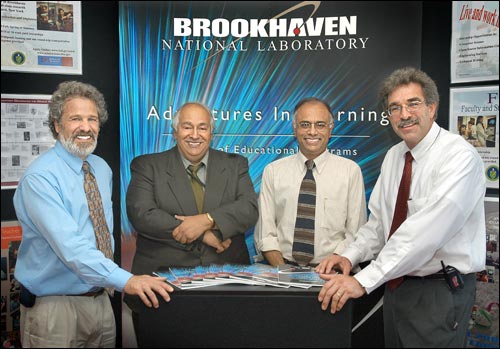Farmingdale State Professor Pursues Fuel-Cell Research at Brookhaven Lab in New U.S. Department of Energy Faculty Sabbatical Program
November 21, 2005
UPTON, NY - Hazem Tawfik, Distinguished Service Professor of Mechanical Engineering Technology and Director of the Institute for Research and Technology Transfer at Farmingdale State University of New York, is on sabbatical leave for the academic year 2005-2006 as he pursues research on fuel-cell technology at the U.S. Department of Energy's (DOE) Brookhaven National Laboratory. He is the first participant at Brookhaven in DOE's new Faculty Sabbatical Program, which is aimed at providing research opportunities to faculty members from minority-serving institutions. At the end of the sabbatical, each faculty member in the DOE sabbatical program is to submit a grant proposal to a federal agency, such as DOE's Office of Science.
 enlarge
enlarge
Pictured (from left) are Peter Faletra, Senior Technical Advisor, DOE's Office of Workforce Development; Hazem Tawfik, SUNY Farmingdale Professor of Mechanical Engineering Technology on sabbatical leave at Brookhaven Lab; Devinder Mahajan, Brookhaven Lab Chemist; and Ken White, Manager, Brookhaven's Office of Educational Programs. (Click image to download hi-res version.)
Tawfik is working with Brookhaven chemist Devinder Mahajan, whose research involves extracting clean fuels from a variety of sources, including methane hydrates, and producing pure hydrogen, without carbon monoxide, for fuel cells. Carbon monoxide poisons, or degrades, expensive platinum catalysts that convert hydrogen into electricity within the fuel cell. Mahajan's research is funded by DOE's Office of Fossil Energy and a Laboratory Directed Research and Development grant. Brookhaven's Office of Educational Programs administers DOE's sabbatical program at the Laboratory, and both DOE and Farmingdale State share in supporting Tawfik's research at Brookhaven.
"This sabbatical opportunity is mutually beneficial to both Dr. Mahajan and me, since we can share our knowledge and ideas, even though we are working on different aspects of fuel cells," Tawfik said. "Also, I'm very pleased to work at Brookhaven because the Laboratory's facilities, such as the National Synchrotron Light Source, are very important to my research. The atmosphere at Brookhaven is also very conducive to research; I can be extremely productive here while relieved of my teaching responsibilities."
Hydrogen-powered fuel cells are efficient, reliable, and environmentally friendly, but durability, cost, and storage and transport difficulties prevent their widespread commercialization. Tawfik is working on the development of metallic bipolar plates, an essential part of fuel cells. The plates deliver fuel and air to electrodes, disperse reactant gases, and remove excess water from the fuel cell. The plates also conduct electrons from electrodes and separate hydrogen and oxygen. In addition, they are the backbone of the fuel cell, providing it with strength and durability.
Bipolar plates are commonly made of graphite composites, but they are not as durable or economical as metal. Most metals, however, are not feasible materials for making fuel cells because their harsh, acidic and humid environment causes corrosion. Tawfik is working on ways to eliminate this corrosion and produce cost-effective metallic plates.
Hazem Tawfik earned a B.Sc. and a M.Sc. in mechanical engineering from Alexandria University in Egypt in 1968 and 1974, respectively. He then went on to earn his Ph.D. in mechanical engineering from the University of Waterloo, Canada, in 1980. Tawfik became a research engineer at Ontario Hydro Research Division in 1980, then moved to Atomic Energy of Canada, Ontario, in 1981, where he was a design engineer and analyst. He became a professor at Farmingdale State in 1983, and he was named Coordinator of the Manufacturing and Mechanical Engineering Technology Department at Farmingdale in 1986, a position he held until 1990. He became Director of the Institute for Research and Technology Transfer at the college in 1996 and has maintained this research responsibility, while taking on his current teaching position at the university since 1983. Tawfik has 25 technical publications and three patents pending in his name.
2005-10396 | INT/EXT | Newsroom









